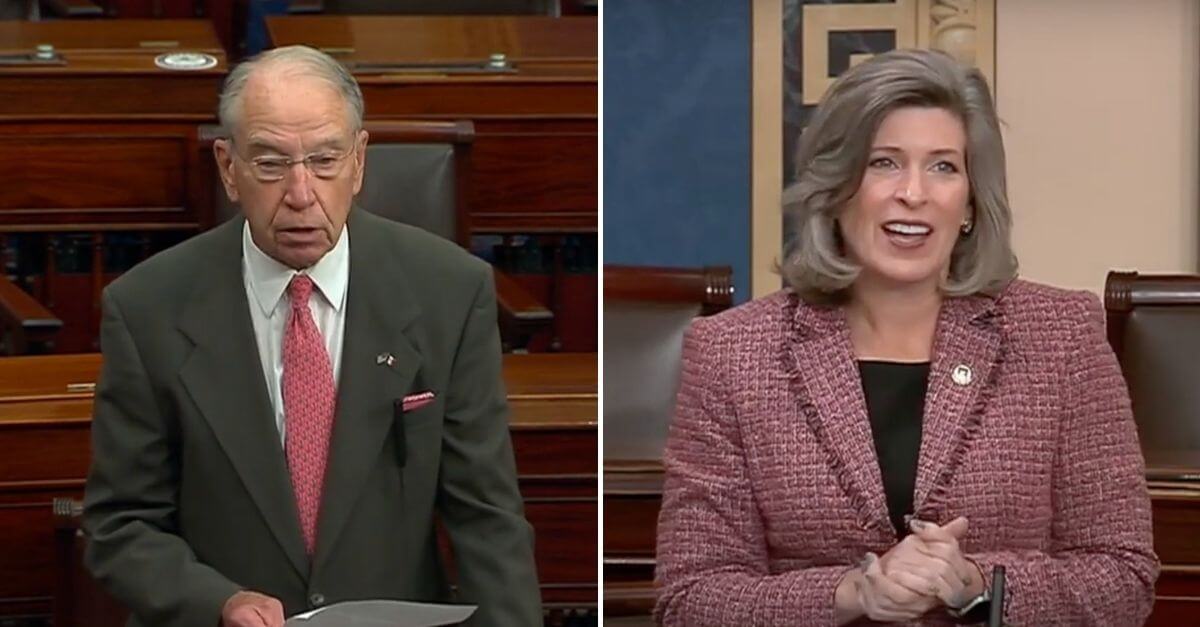
Since the overturn of Roe v Wade, Americans have spent the summer worried about other civil rights that could be reversed by the US Supreme Court.
House Democrats responded Monday with their Respect for Marriage Act, which would codify same-sex and interracial marriage by requiring the federal government to recognize those marriages. It also requires states to recognize out-of-state marriages regardless of the sex, race, ethnicity or national origin of the married people.
The bill passed the House 267-157 with full Democratic support, and only 47 Republicans.
Now the bill moves on to the Senate, where Sens. Chuck Grassley and Joni Ernst have been unclear about where they stand.
[inline-ad id=”0″]
Grassley didn’t commit to supporting the bill. He said he would review the legislation but he didn’t think the right to marriage was being threatened.
When asked by reporters he said, “The right to gay marriage is not currently an issue, simply because one justice mentioned it very briefly in a previous decision in a concurrence that he wrote.”
In his concurring opinion to the Dobbs v Jackson abortion ruling, Justice Clarence Thomas floated the idea that Court decisions regarding same-sex marriage (2015), and contraception (1965) are on the same shaky ground as abortion rights. He did not mention interracial marriage (Loving v Virginia, 1967).
Grassley also told reporters, “It’s [same-sex marriage] the law of the land.” That phrase had been used to describe to Roe too, including by the justices who overturned it. Grassley didn’t respond when a reporter pointed that out.
[inline-ad id=”1″]
Ernst’s response was less clear.
She told reporters she hasn’t seen the bill but was open-minded about it. When asked if she supports same-sex marriage, Ernst said, “I have a good number of very close friends that are same-sex married.”
Iowa Reps. Cindy Axne, Ashley Hinson and Mariannette Miller-Meeks voted for the bill. Only Rep. Randy Feenstra voted against it.
The Respect for Marriage Act officially repeals the Defense of Marriage Act (DOMA), which only recognized marriage between a man and a woman. If this bill is passed and signed, DOMA will not go back into effect if the Supreme Court reverses their 2015 decision in Obergefell v Hodges.
[inline-ad id=”2″]
While the bill requires the federal and state governments to recognize all legal marriages, including those that were legal when they were entered into, it does not require states to allow same-sex couples to marry.
Thursday, House Democrats and eight Republicans voted to protect individuals’ rights to access and use contraceptives. The Right to Contraception Act also protects healthcare providers’ ability to provide contraceptives and information about contraception.
This means the right will not be impacted if the Supreme Court reverses the 1965 Griswold v Connecticut decision.
Nikoel Hytrek
07/21/22
[inline-ad id=”0″]
Have a story idea or something I should know? Email me at [email protected]. You can also DM me on Twitter at @n_hytrek.
Iowa Starting Line is part of an independent news network and focuses on how state and national decisions impact Iowans’ daily lives. We rely on your financial support to keep our stories free for all to read. You can contribute to us here. Also follow us on Facebook and Twitter.
Support Our Cause
Thank you for taking the time to read our work. Before you go, we hope you'll consider supporting our values-driven journalism, which has always strived to make clear what's really at stake for Iowans and our future.
Since day one, our goal here at Iowa Starting Line has always been to empower people across the state with fact-based news and information. We believe that when people are armed with knowledge about what's happening in their local, state, and federal governments—including who is working on their behalf and who is actively trying to block efforts aimed at improving the daily lives of Iowan families—they will be inspired to become civically engaged.


Iowa Republicans make outlawing gay marriage key 2024 campaign priority
Iowa Republicans have made outlawing gay marriage a key goal in their 2024 party platform. During the Iowa GOP’s 2024 state convention on Saturday,...

Department of Justice says Iowa immigration law violates US Constitution
If Iowa doesn’t suspend the enforcement of its new immigration law by May 7, the state could face a federal lawsuit, according to the Des Moines...

Rushing: Iowa State president said the quiet part out loud
I want to thank Iowa State University President Wendy Wintersteen for doing us all a favor by finally saying the quiet part out loud: all the...

Iowa sets aside almost $180 million for year two of voucher program
Iowa has committed nearly $180 million in taxpayer funds to support private school tuition in the 2024-25 school year, which is almost $50 million...

Kalbach: Immediate action needed on corporate ag pollution
Iowa agriculture has undergone substantial changes over the past 40 years. We see it all around us. Rather than crops and livestock being raised on...

VIDEO: Jochum calls Gov. Reynolds’ summer meal program a ‘hunger game’
Iowa Gov. Reynolds announced a competitive $900,000 grant program to feed Iowa children over the summer, months after she declined $29 million in...





